Magical and perfect to love Peruvian literature
Hello to all those who love the wonderful city of Kings! It is said that to meet with literature is to travel to a world full of surprises, in which you can in one way or another rediscover yourself. Reading makes us free, and to find a place where you can let loose this passion, luckily nowadays this exists in many parts of Lima. A clear example of this is without a doubt the House of Peruvian Literature, which can be found in the brand-new historical center of Lima.
A house with a lot of history:
As I have already told you in another post, the House of Peruvian Literature is situated on what in olden days was the center of the railroads that connected Lima with Callao, and moreover today it also has the famouse train that connects Lima with Huancayo also known as The Macho Train.
Every time I come to the center of Lima, I can't keep from retracing its streets and falling in love to the maximum with every one of its monuments, and evern though today I already know almost all of them, I always look at my city through different eyes, because I always find something new, and that is what moves me every time I come to the House of Peruvian Literature, which is a center open to the general public of all ages, in which a book will take you on an adventure that you will never be able to forget in your journey through the city of Kings, my beloved Lima.
Here I will show you how the facade of the House of Literature actually shines, which thank goodness has been very well preserved and is in one of the busiest places, with visitors who arrive daily to see the historical center of Lima, which is considered a UNESCO World Heritage Site, a source of pride for many Peruvians, and Peruvians who love the place that saw us born:

How to get to the House of Peruvian Literature?
Getting to the House of Peruvian Literature isn't complicated -- it's impossible to get lost! To come to the historical center of Lima, a lot depends on where you begin, but once you're in the center of my city, you will find infinite cars or minibuses that will bring you to the center. Nonetheless, it's possible that this will be one of the options where you will spend most of your time arriving, because there is no denying that vehicular traffic in Lima is a real nightmare.
In case you want to avoid city traffic, the best thing to do is to take the "C" line on the Metro, and get off at the station "Jirón de la unión. " From there, you can continue your journey via a pedestrian street, very crowded with Limeñxs. Here you will see many clothes shops and food, and you will be able to go up to what would be our Plaza de Armas, where the color yellow stands out, something that I always remember about Lima, and also a flower that doesn't bloom very often, and that is from this zone, known as the flower of Amancaes.
When you arrive at the Plaza de Armas, what you should do is look to the lefthand side of the Palacio de Gobierno. There you will find a street where there is also a green balcony that was known as the Casa de Oidor and I can tell you that this house is one of the buildings with the oldest balconies in my beloved city.
Going straight along this way, you will find a small pedestrian street, where you should continue in a straight line to arrive in front of the House of Peruvian Literature, a true work of architectural art, and as I told you, it's absolutely free to go in. Today, many boys and girls come here for school fieldtrips within the city capital.
Peruvian literature invites you to meet it openly:
To speak about Peruvian literature, we have to speak of the different personalities that have given life to our beloved history, by means of their writing, by means of their thoughts and perceptions about life, by means of their moment of stating that the world doesn't end in this territory, and that there is much more beyond that which every one of us can imagine.
The House of Peruvian Literature has thrown itself into the primordial objective of being a focal point of a great deal of information and representation of Peruvian culture regarding writing. Here one can find different exhibits, some temporary and others permanent.
I would not consider myself a huge fan of literature and writing, but I can't deny my admiration for those Peruvian characters who by only reading them make me realize how important it is to pass along tradition and education to new generations through a book. This is why they say "reading gives us more freedom and solidarity, " and without a doubt reading opens your mind and takes you out of this world, to your own world in which you can decide the manner, the face of your characters, and other details... in a way, you can feel like the director of a great stageplay.
We have in Peru a large quantity of authors who have served as shining examples of what it means to be a representative of Peruvian culture. Here we have as an example our great American poet... I refer to Cesar Vallejo with his poem that comes to mind and that I want to share with you so taht you can know a bit more about the value of his words and simplicity.
At the end of the battle,
and at the death of the combatant, there came before him a man
who said to him: "Don't die... how I love you! "
But the corpse - oh! - he continued dying.
Two more drew near him and repeated:
"Don't leave us! Courage! Come back to life! "
But the corpse - oh! - he continued dying.
There come to him twenty, a hundred, a thousand, five thousand,
clamoring, "So much love and it means nothing in the face of death? "
But the corpse - oh! - he continued dying.
Millions of individuals surrounded him,
with one common plea: "Stay with us, brother! "
But the corpse - oh! - he continued dying.
Then all the men of the earth
surrounded him; the sad corpse saw them, overcome;
slowly he took leave of his body,
hugged the first man, and began to walk...
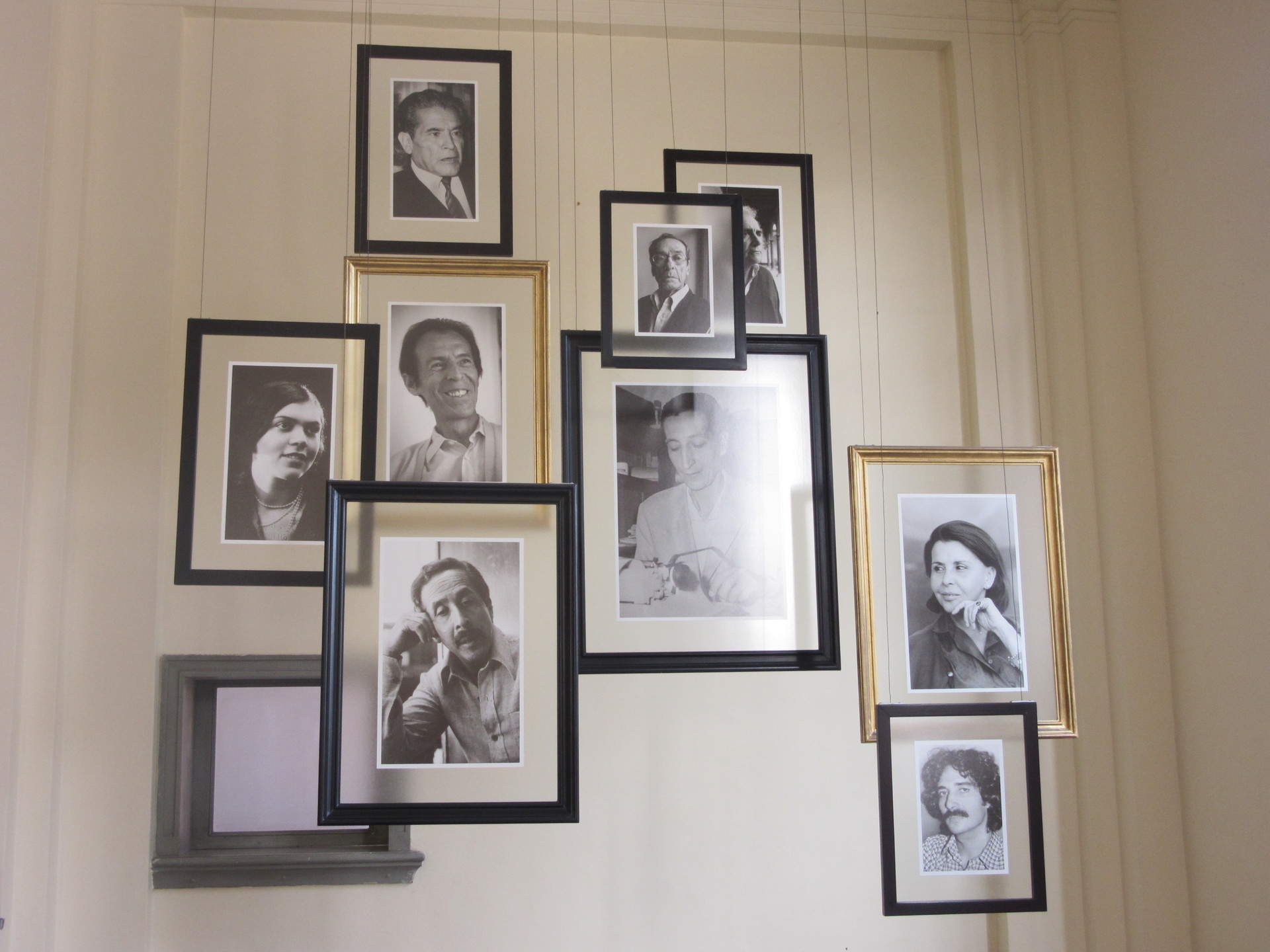
The poem that we just read belongs to Cesar Vallejo and it goes by the title Dough. I remember a lot from my school, and I remember with much fondness that my history professor in primary school made my classmates and I learn this poem, and every time we had Peruvian history class, we started by reciting this poem, in which you can realize the conveyed themes of union, love, justice, that justice which Cesar Vallejo was always seeking in his writing.
The vultures without feathers
The next author that I was to share with you is also connected with infancy, and belongs to the past century. One of his works is simply a story full of messages, and it has the title "The Vultures Without Feathers" by Julio Ramón Ribeyro.
The text of this story begins as such:
"At six in the morning, the city awoke on tiptoe and began to take its first steps. A fine mist dissolved the outlines of objects and made something like an enchanted atomsphere. The people who traversed the city at this hour appeared to be made of some other substance, seemingly belonging to some phantasmal order of life. The devout dragged themselves laboriously to disappear beneath the churches' awnings. The night-walkers, saturated with the night, returned to their homes covered in their scarves and in melancholy. The trash collectors began along the Avenue Pardo their sinister route, armed with brooms and carts. At this hour, one would also see laborers walking to the tram, policemen yawning against trees, newspaper vendors purple with cold, servants taking out buckets of trash. At this hour, finally, like some sort of of mysterious sign, appeared the vultures without feathers. "
(If you want to read the story, I invite you to do so, click aquí so that you can read it in full, and I assure you that you will enjoy it as much as I do.
"Vultures without feathers" by Julio Ramón Ribeyro is one of my favorite pieces, not only because of the fact that its events take place in my city (Lima) but also because it brings us along on its reconsideration about what we actually do with many boys and girls who instead of studying and living their childhoods to the fullest, work day and night, and are exploited in such a manner that feeds an economic system that day and night agonizes and damages many Peruvians, even today.
Julio Ramón Ribeyro uses these differentiated urban personalities to be able to give them a voice, so that those of us who have his pages before us can realize how important it is to help those who have no hope of anything changing. On the other hand, it's also a story with a heartbreaking history, and it's impossible to not feel moved when the pig begins to eat the dog. The imagination can be so strong that this story definitely marked me so strongly that before moving back to Italy I had the privilege of telling it to my eight-year-old brother, and I loved being able to tell him this story so that he can also treasure it in his memories. And I hope that the day will come when he too can share it with many more people. Literature has no limits, and it's a true joy to be able to help others so that they too can discover this marvellous hobby, which as I told you initally, makes us more free.
So many things to tell, so many things to discover:
The House of Peruvian Literature is a jewel of architecture, which blends perfectly with everything related to Peruvian literature that you can find in its interior. One of the things that most came to my attention is the stained glass window that you can find above the staircase that instead of taking you towards the uppermost part makes you descend. In one of those walls, you will also find an image on a column of the designer, or better to say the architect of this work of art:
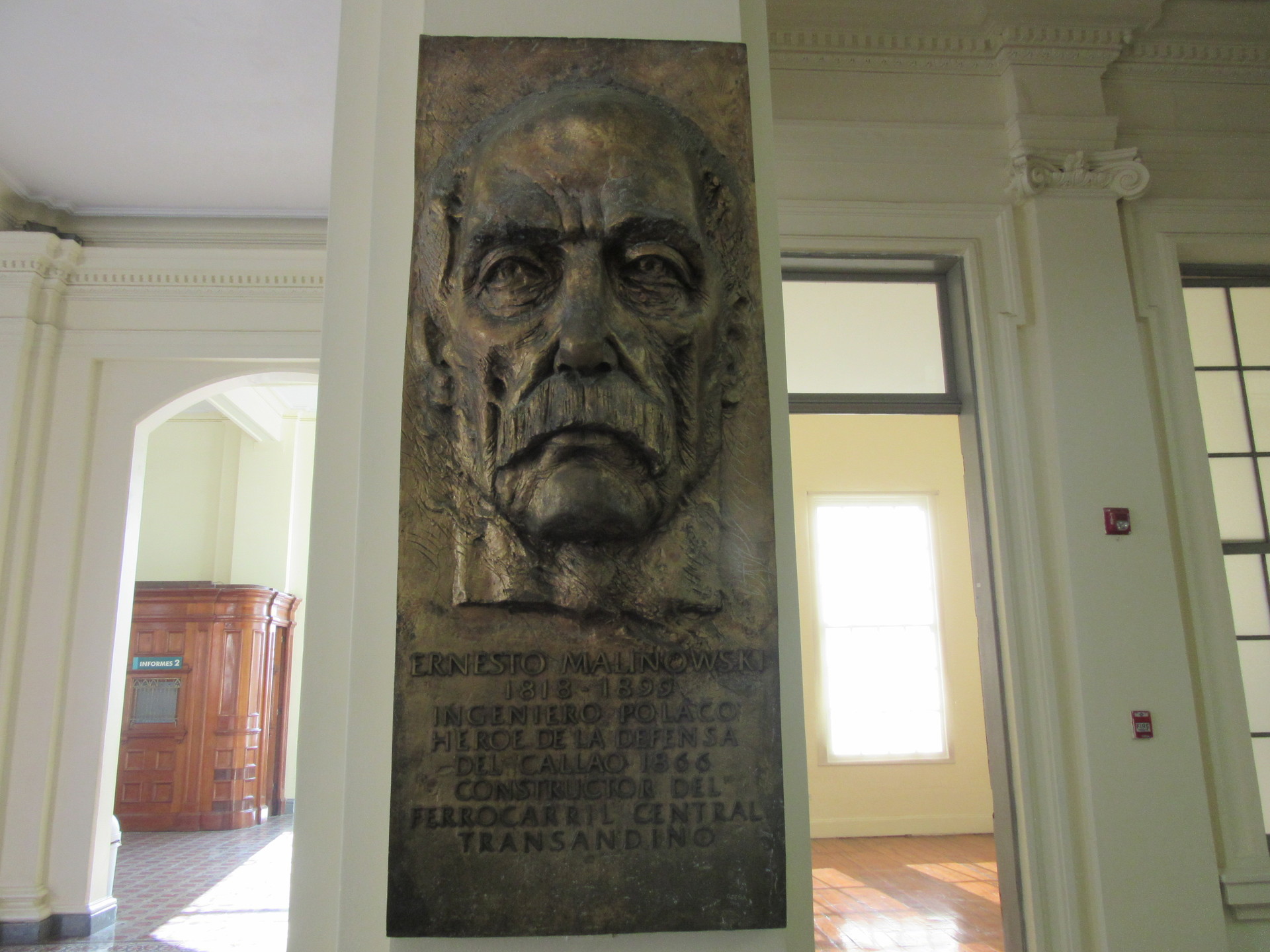
Listen to the writings of the experiences of different citizens who loved literacy:
As I was previously telling you, every time I come to the House of Peruvian Literature, I find something new that seduces and draws me in to wander curiously through every one of its rooms. This time entering along the lefthand side, I found a room in which there were different screens with headphones so that I was able to get settled and listen in an intimate manner. The experiences of a citizen of Lima who loves reading with a book is specific to their relationship with the book, with the author, with what literature tells them in how it refers to opportunities, and the manner in which it helps them combat their fears and find in another manner the peace which all human beings are looking for within ourselves to be happy and have the courage to keep living. There were many stories that touched my heart in some way, and in some of them I felt very identified, and to understand the courage it takes to read was like realizing that, one way or another, in Peru we are advancing little by little, to open more and more minds for the wellbeing of all.
Here, for example, I will show you a wall on which you can see (well, you can't see much... :S) some of the screens with their respective headphones. At the side, in the upper part, you can find an outstanding sentence about the life of each one of the interviewees, and about what literature provoked in their lives.
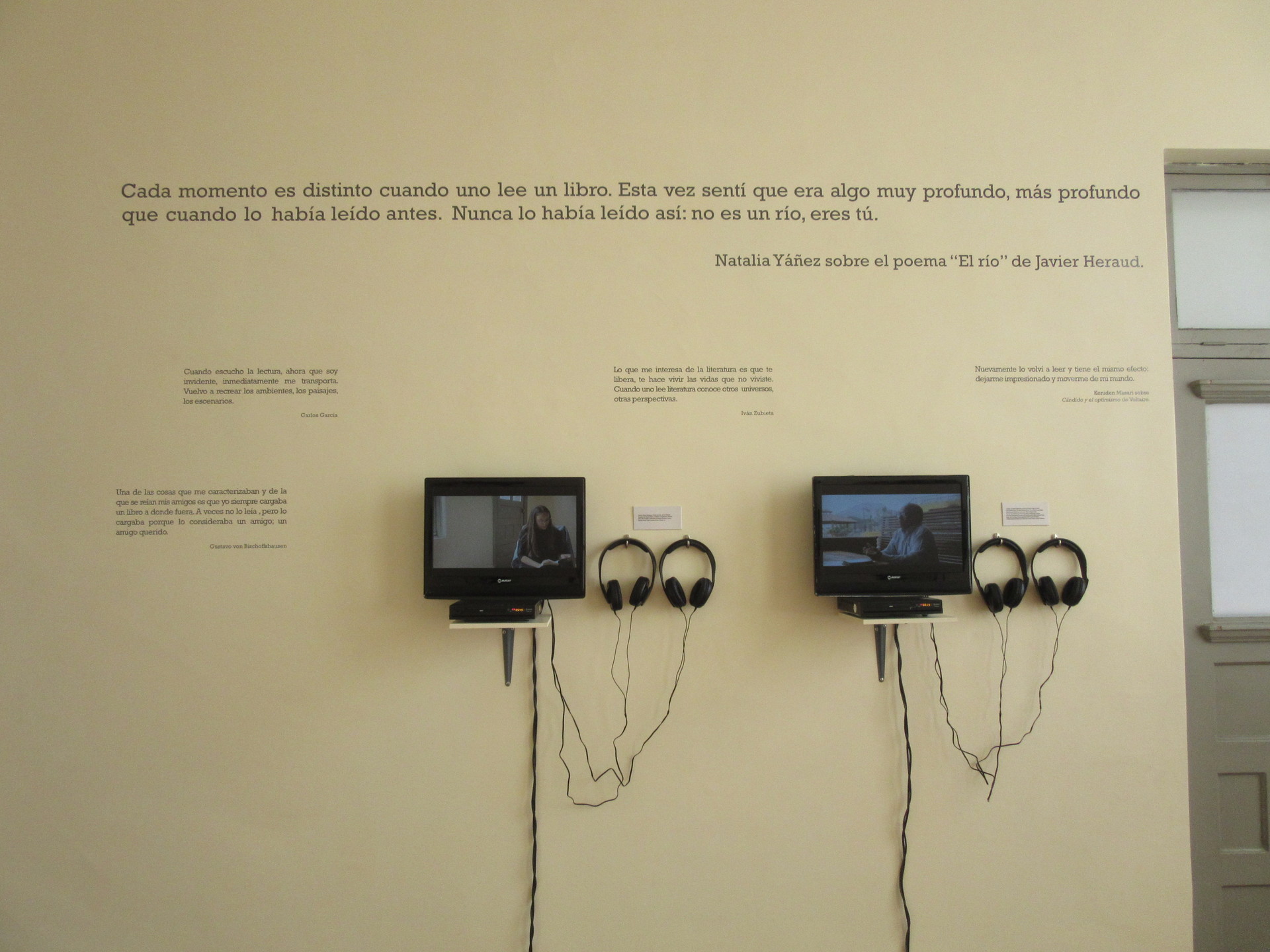
Dressing like a student to be able to read:
There is a story that grabbed me when I began to listen, and today I want to share with you some of the things that stick in my memory.
The story of this boy begins with a book. This boy enjoyed reading so much, and he couldn't find an ideal place where he could find a library or meet with people who had the same passion as he did. He lived in an area very far from the center of Lima, but this was no impediment, and he began to follow his dream of being able to read and enjoy his passion.
What did he do to reach his goal? He had already finished school. He was nearly an adolescent, graduated from a national secondary school. So what he did to enter was dress like a student so he could come to the center of Lima, and so be able to pay the student fares for Lima's combis, and he went out more because of it, and he was able to come almost every day to the House of Peruvian Literature.
For this boy, here he found a library and and a place where you can feel peaceful enough to read a book. He found in this space the perfect place to go ahead and cultivate his passion and his hobby of reading. When I listened to his story, it truly moved me a lot, and for a moment I thought that perhaps he would dedicate himself to literature. But in truth, then he gave as information in that interview that he would like to be an engineer, and he studied in the House of Peruvian Literature so that he could be at peace and could dedicate himself to completing his exercise workbook to apply for the University of Peru.
I left with the feeling that sometimes we have the stupid prejudice that a person who studies engineering can't enjoy as fully as a person who can belong, for example, to the faculty of letters or humanities. In truth, I really enjoyed listening to this boy's story:
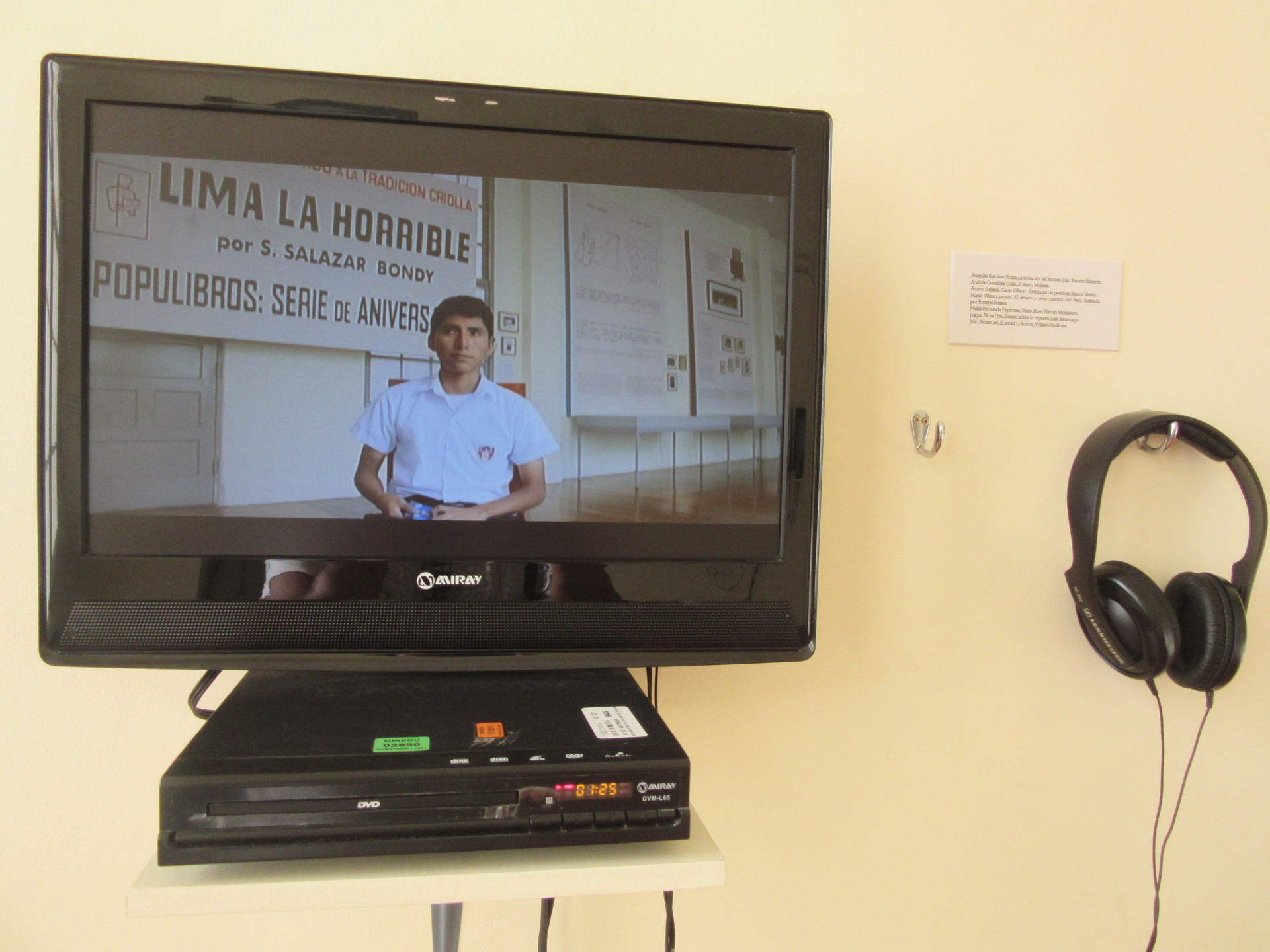
An example of a mother:
There were many stories that touched my heart. The next time, what I did was I took a picture of the image of the next sentence so that you could also know it, and by that means I would have my souvenir:
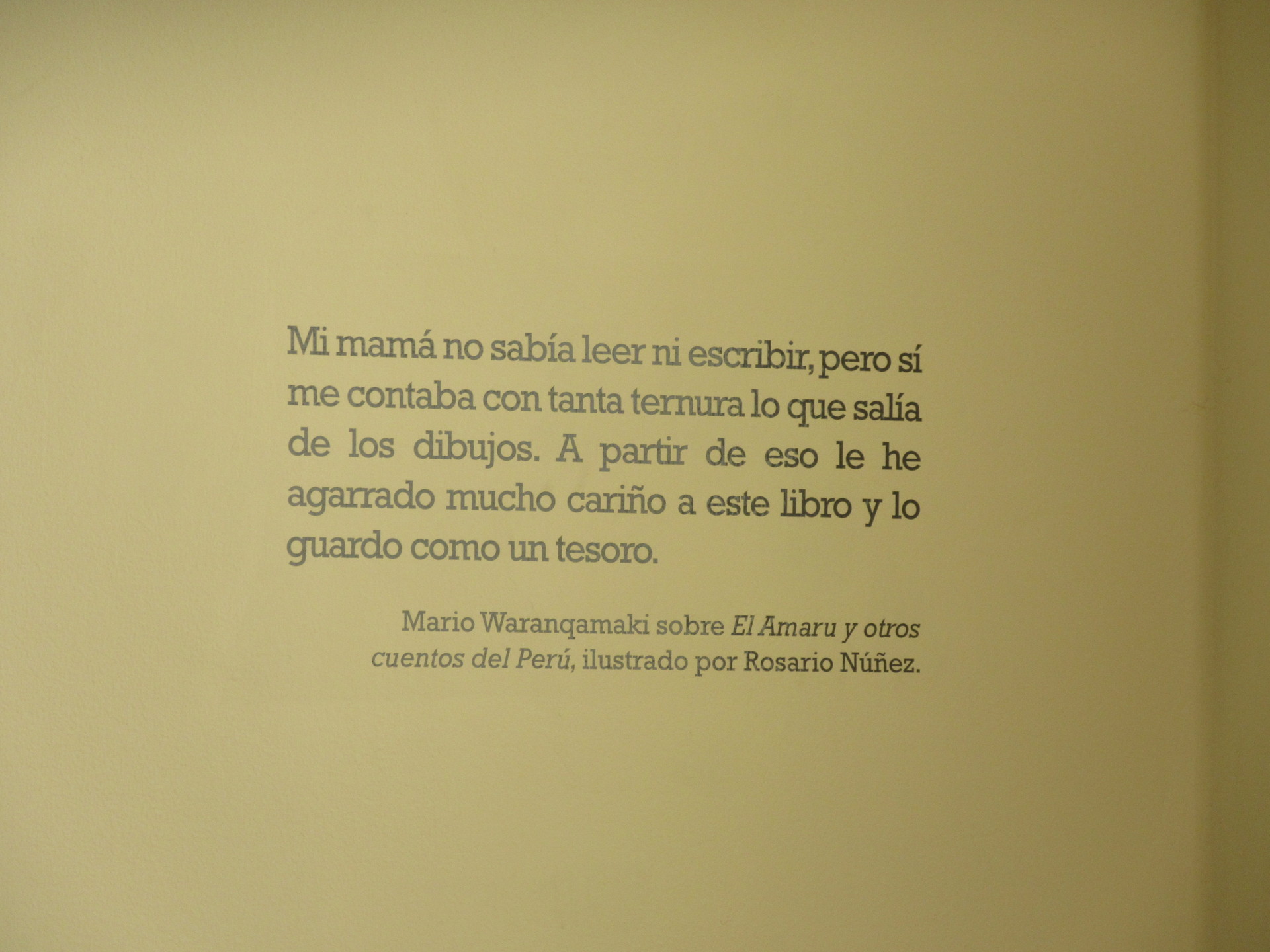
This case was that of a boy who lived in the mountains, and who lived with his mother who didn't know how to read. Nevertheless, she managed to obtain a book of stories, in which there was on one page a full drawing, and on the other page writing. He in his childhood innocence asked his mother what the story said that was written in the book.
There is no doubt that mothers are wise, and that they were put in this world for a reason, and she didn't deny her son the right to make his imagination unfurl. What his mother did was to invent along with the drawings a story. His mother turned into a sort of author for him, in which she learned to tell stories by means of the different drawings that he looked at with so much love. Today, his mother is no longer on this earth.
What lovely stories I listened to in that room. In truth, I stayed nearly an hour along in this room, and don't think that I've finished with it, because there is still much, much more to tell in these stories that there are en the House of Peruvian Literature.
We don't only speak Spanish... we speak many other languages in Peru:
After listening to the life stories of those citizens, my attention went to another room that I had come to visit. This time it was a room dedicated to the languages originating in Peru, of which there are approximately... do you know how many languages we have? Well, no more and no less than 42 languages that are native to our national territory. Can you imagine that?
Over the loudspeakers you can hear the voices of different people who speak in a language originating in Peru. They prove in this way not only that they are connoisseurs of a tradition, but also that they feel very proud to come from different communities, which have offered them tranquility, inner peace, and respect for their community.
The writings of Peru extend to far more than just the Spanish language. While it is the most widely spread language, every Peruvian has the duty to preserve all the other languages of Peru, so that we maintain our traditions and customs that have been passed down from generation to generation.
Here I will share with you an image of that room which you can see in my tour.
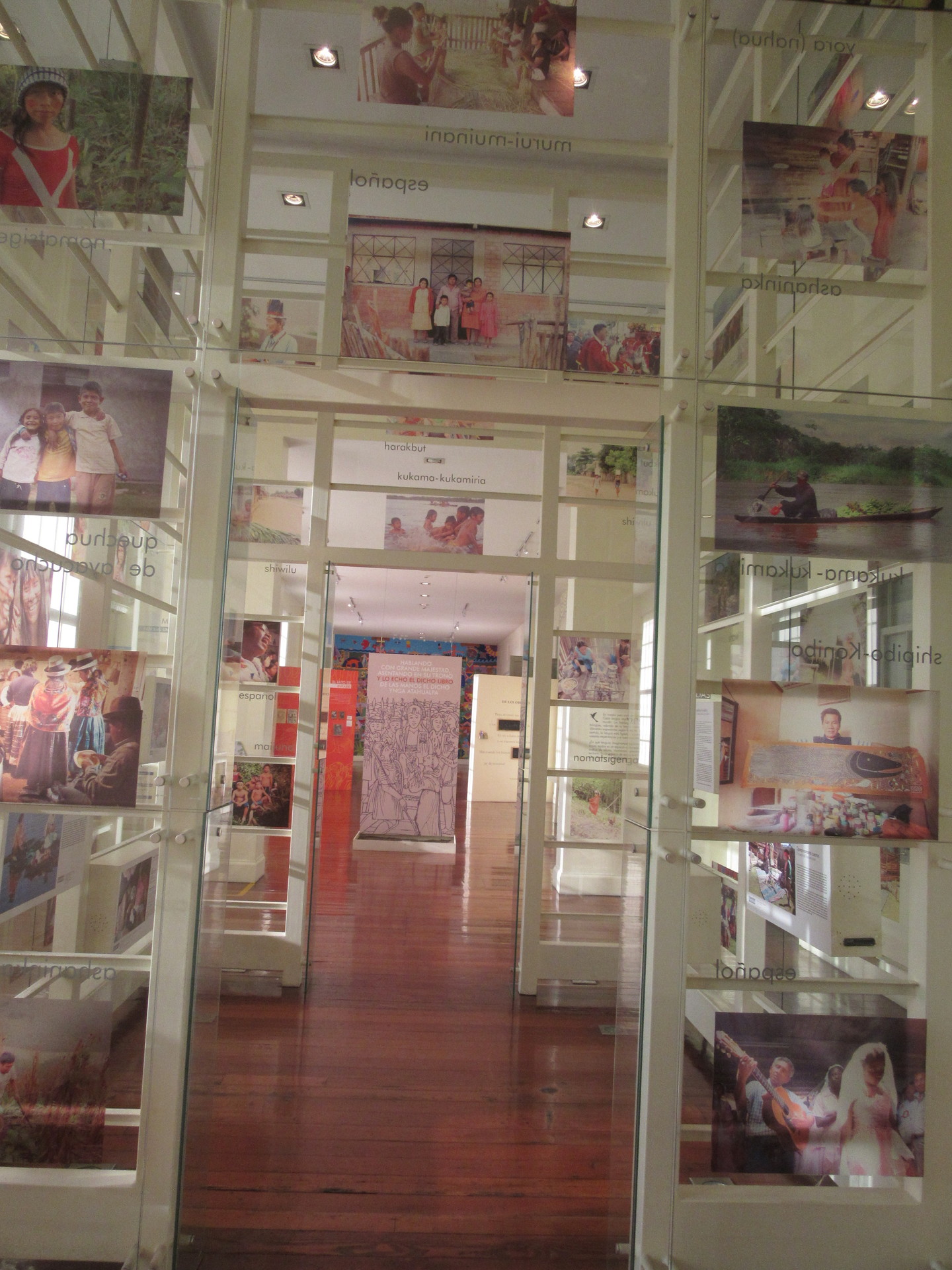
In another section, you can find in addition to this a linguistic map of Peru, where you can find it divided by family groups. Sadly, there is still a lot to do in this area, and I think the government needs to get moving to ensure that all these languages continue to be valid in our territory, and that we maintain our vision of the world and our legacy that is so rich and unique in the world like we've been able to be so far.
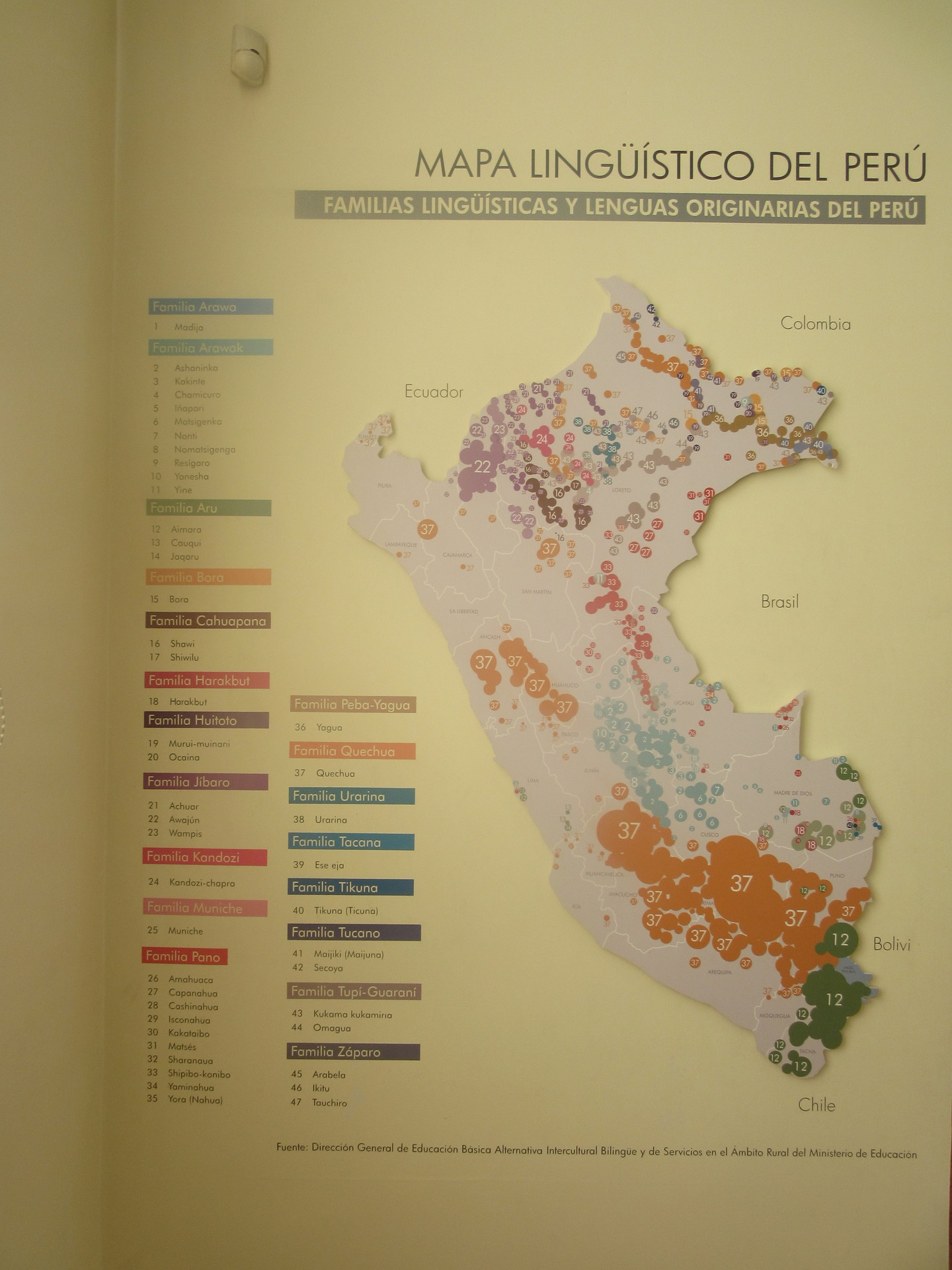
Now, we also have to be realistic about one thing that occurs in Peru, the theme of racism around someone's place of origin. According to some investigations, many young people from small towns who move to the city try to erase from their past their original language, because in that way they will feel less discriminated against. When I read these sorts of things, it sparks in me an anger and outrage that even between Peruvians we look for those differences to make people feel less, when we should really work on realizing the courage it would take to learn that of the other. Moreover, as we are a multiethnic nation in which many different communities live together, and in which we are all of one, same blood, the theme of racism is a pressing one, and if I go on writing about it I think I would never stop, and maybe we would find ourselves agreeing on certain things, and on others no. But I think that the most important thing is to give wellbeing and respect to everybody.
Colors of the rainforest:
There between the simplicity of its people and the biodiversity of its nature you will find our dear Peruvian rainforest, and in the House of Peruvian Literature, I was able to find a representation of the rainforest, made by a gentleman from that zone. It stirred in me so many sensations, so many good wishes.
Art, my dear friends, serves also to educate, to open minds, and to make us more tolerant of one another. If everybody had access to education and we received love, I think that the theme of these arguments or situations about racism would disappear thusly. No to discrimination!
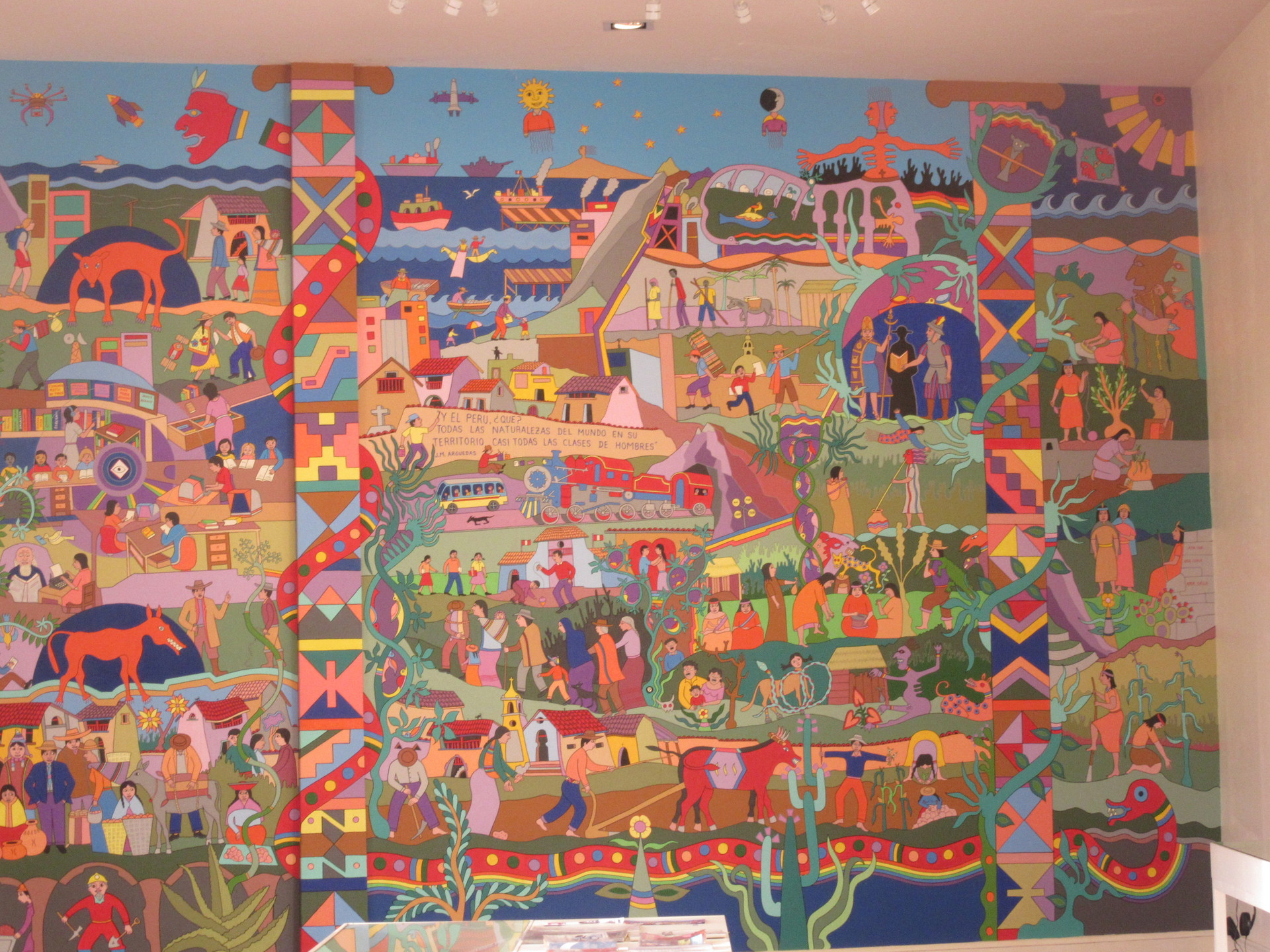
As we have been able to go along with my experience, dear friends, in the House of Peruvian Literature you don't only go to read books, but to also receive a mountain of sensations, to understand many situations, and to allow ourselves to come for the art that can be found in its rooms. I haven't had the pleasure of meeting someone who has taken charge of being a curator for this work, but in truth it makes me very happy that these points of culture in my city are developing, and the best of all is that it's free, and as such there is no reason to say "I can't go, " or that "culture is only for those who have money. " NO! Culture is open for all of us, and it's there that we should emphasize to allow entry to all Peruvians and visitors who have the right to live a free and heartwarming experience.
I part that I also want to share with you are these images from the imaginary of birds made with paper and bathed in colored metal, this decoration I found in the part of the room dedicated to the rainforest.
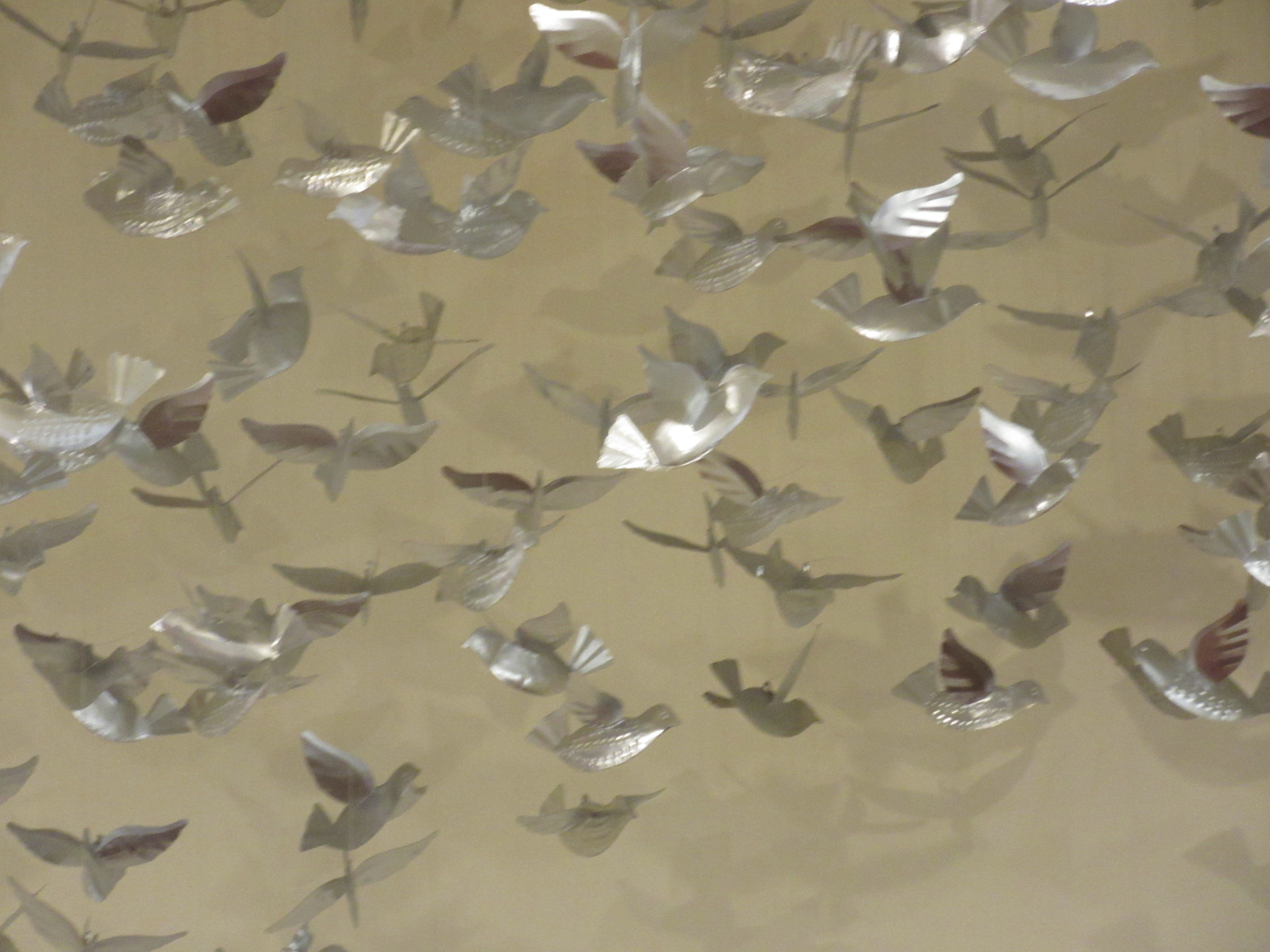
Another image that I also want to share with you is the following, if you can see in the upper left part, it says "arrival in Lima". I find this image a little funny, because here you can find disorder in the middle of people walking, in truth, something that really does occur in my city. In the middle of the disorder, there live many Limeñxs, who day after day nevertheless go on receiving many other Peruvians from different parts of Peru with the option finding better opportunities.
I remember, for example, that Lima of the 40s and 50s, in which there began a strong migration to the capital city, and it continued on so that today Lima is a city of all bloods, and that our Lima has received influences from many parts of Peru, giving as an example, the strong influence because Lima has a lot of everything, a little of all of Peru. At the same time, I believe that if we were to speak of gastronomy, nobody could argue that in Lima you can eat very well.
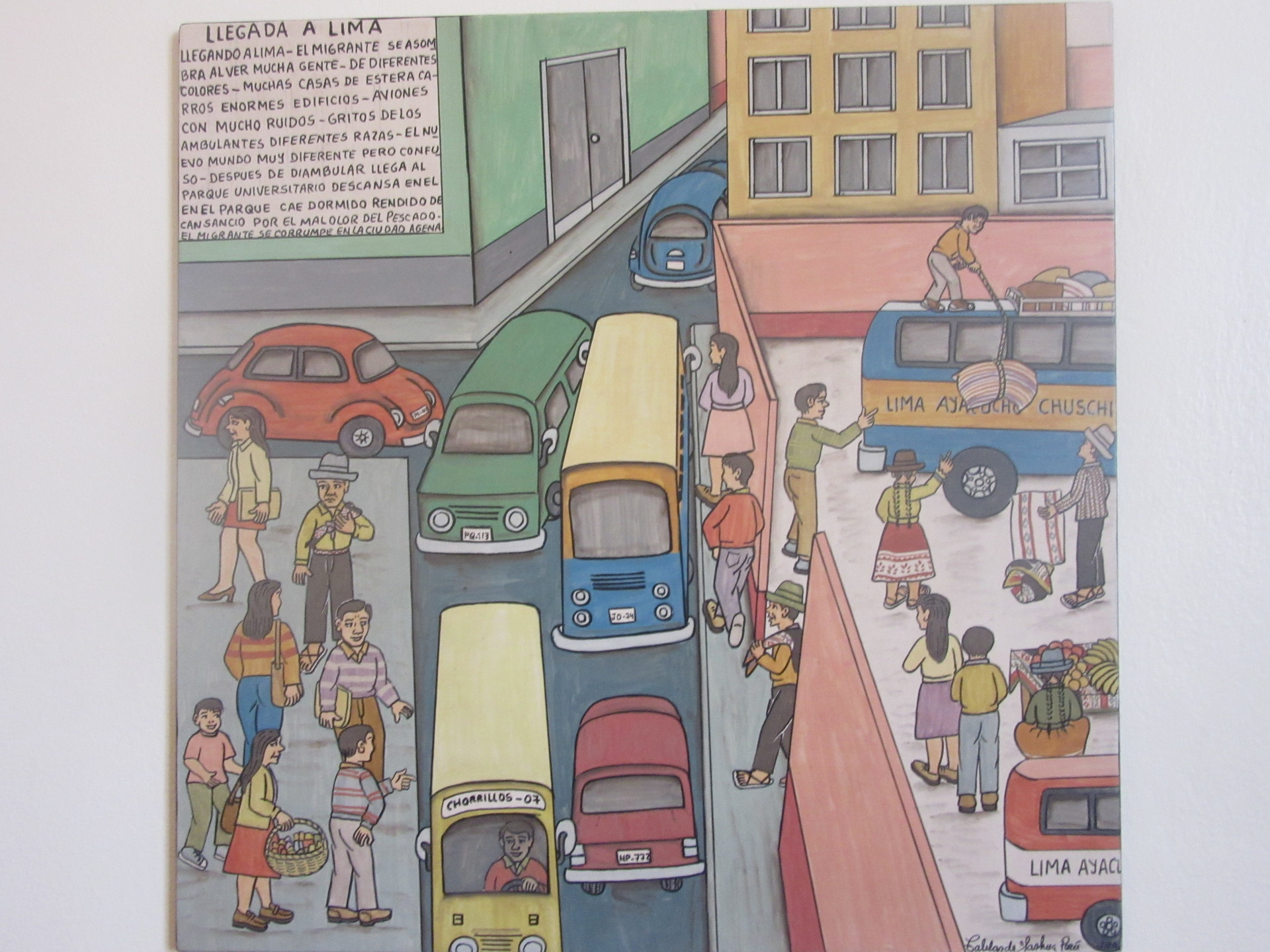
And here, dear friends, I end my tour of the House of Peruvian Literature, a place that has been reinvented and that always offers alternatives and options for all tastes. Literature, as we have seen, is a great fountain of inspiration, and so I invite each one of you to also come to understand and feel every one of the sensations that I have been able to experience while being here, a marvelous place, and that has opened for me doors to a world. A book is the strength that we need to understand ourselves, and to understand the world that surrounds us.
Many thanks for reading these lines. This time I have wanted to show you the sensations with the photos that I was able to take during my last visit. I'm certain that there will be many, many more that I will go on finding here in my next visits. I don't doubt that the next time that I come to Lima, I will visit without a doubt this place in the center of Lima.
Go on harvesting the world of literature in this marvelous hobby, and we will see each other in other stories and places. I hope you find yourselves in the City of Kings, my beloved Lima, to which I dedicate every one of my entries in this blog.
Hasta pronto, lovers of Lima! We will see each other in other stories with more places and points that we can come to know in the center of Lima, and in many other parts of the city, which is as we know, a UNESCO World Heritage Site, and has the great potential to go on being a great city.
I hope all of you have a marvelous day.
Photo gallery
Content available in other languages
Rate and comment about this place!
Do you know House of Peruvian Literature? Share your opinion about this place.






























